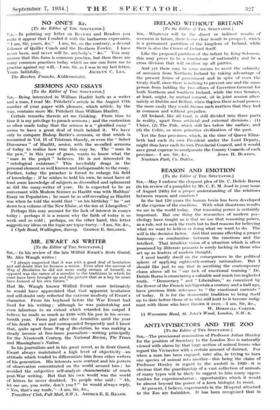SERMONS AND ESSAYS
[To the Editor of THE SPECTATOR.] Sia,—Being interested in William Hazlitt both as a writer and a man, I read Mr. Pritchett's article in the August 17th number of your paper with pleasure, which article, by the way, contains more Mr. Pritchett than William Hazlitt.
Certain remarks therein set me thinking. From time to time it is my privilege to preach sermons ; and the contention so often made today that the sermon is a "glorified essay" seems to have a great deal of truth behind it. We have only to compare Bishop Butler's sermons, or that which is recounted in Vol. II of Tristram Shandy, or even the" Select Discourses" of Hazlitt, senior, with the so-called sermons • of today to realize how true this may be. The "man in the pew,". in this year of grace, wants to know what the man in the pulpit" believes. He is not interested in "ontological existence." This inevitably drags in the personal element so well known and indispensable to the essay. Further, today the preacher is forced to enlarge his field of knowledge ; if he wishes to hold his own, he must have at least some knowledge of subjects as diversified and ephemeral as did the essay-writer of yore. He is expected to be as conversant with Modem Science as Hazlitt was with Malthus' Essay on Population ; he must be as self-revealing as Hazlitt was when he told the world that "on his birthday" he "sat down to a volume of the New Eloise, at the inn at Llangollen."
Perhaps this may account for the lack of interest in essays today ; perhaps it is a reason why the faith of today is so weak and so cold ; perhaps, on the other hand, this letter suggests my ideas on the topic are topsy-turvy.—! am, Sir, &e., 1 Clyde Road, Wallington, Surrey. GEORGE E. SHEARER.






































 Previous page
Previous page